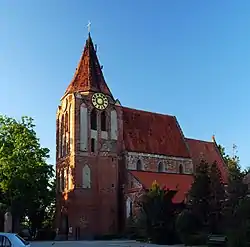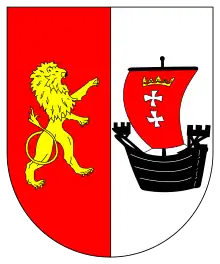Pruszcz Gdański
Pruszcz Gdański (pronounced [pruʂtʂ ˈɡdaj̃skʲi]; former Polish: Pruszcz) is a town in Pomerania, northern Poland with 26,834 inhabitants (2010). Pruszcz Gdański is an industrial town neighbouring Gdańsk, part of the Tricity agglomeration. The Tricity Bypass begins in Pruszcz Gdański.
Pruszcz Gdański | |
|---|---|
 Exaltation of the Holy Cross Church | |
 Flag  Coat of arms | |
 Pruszcz Gdański | |
| Coordinates: 54°16′N 18°38′E | |
| Country | |
| Voivodeship | |
| County | Gdańsk |
| Gmina | Pruszcz Gdański (urban gmina) |
| First mentioned | 1307 |
| Town rights | 1941 |
| Government | |
| • Mayor | Janusz Wróbel |
| Area | |
| • Total | 16.47 km2 (6.36 sq mi) |
| Population (2021) | |
| • Total | 31,822 |
| • Density | 1,900/km2 (5,000/sq mi) |
| Time zone | UTC+1 (CET) |
| • Summer (DST) | UTC+2 (CEST) |
| Postal code | 83-000 |
| Area code | +48 58 |
| Vehicle registration | GDA |
| Highways | |
| National roads | |
| Voivodeship roads | |
| Website | www |
The capital of Gdańsk County in the Pomeranian Voivodeship since 1999, previously in the Gdańsk Voivodeship from 1975 to 1998. The town is served by a railway station.
History

Human settlement in Pruszcz Gdański dates back to prehistoric times. Various traces of human settlement and cemeteries from the Bronze and Iron Ages and ancient Roman times were discovered during archaeological excavations within the modern town limits. The territory became part of the emerging Polish state in the 10th century under its first historic ruler Mieszko I. The oldest known mention of Pruszcz comes from 1307.[1] It was invaded and occupied by the Teutonic Knights in the following years. In the 14th century, the Radunia Canal was built.[1] In 1454, King Casimir IV Jagiellon reincorporated the area to the Kingdom of Poland.[2] During the subsequent Thirteen Years' War, it was the site of the Battle of Pruszcz Gdański between forces from the Polish-allied city of Gdańsk and the Teutonic Knights.[1] The restoration of the region to Poland was confirmed by the peace treaty of 1466.[3] Pruszcz was a possession of the city of Gdańsk, administratively located in the Pomeranian Voivodeship in the Royal Prussia and Greater Poland provinces.[4] Polish Kings often stopped in Pruszcz when travelling to the nearby city of Gdańsk.
Pruszcz was annexed by the Kingdom of Prussia in the Partitions of Poland, and from 1871 to 1920 it was also part of Germany. It had a mixed Catholic and Lutheran population, with small Jewish and Mennonite minorities.[1] Unlike most of Eastern Pomerania, the town did not return to Poland after regaining independence, but was included in the short-lived Free City of Danzig by the Treaty of Versailles. During World War II, it was occupied by Nazi Germany. Poles from Leśniewo and Swarzewo were enslaved as forced labour at local farms,[5] and Jewish women were similarly enslaved in a subcamp of the Stutthof concentration camp.[6] Following Germany's defeat in the war, the town became again part of Poland.
As early as 30 March 1945, the Polish Post Office began its work as the first post-war Polish institution in the town. In post-war Poland the adjective Gdański was added to the town's name, after the nearby city of Gdańsk, to distinguish the town from other Polish settlements of the same name.

Education
Schools:
- Zespół Szkół Ogólnokształcących nr 1
- Liceum Ogólnokształcące
- Gimnazjum nr 1
- Szkoła Podstawowa nr 2 w Pruszczu Gdańskim - School website
- Szkoła Podstawowa nr 3
- Zespół Szkół nr 4
- Katolickie Szkoły Niepubliczne im. Jana Pawła II - School website
- Prywatna Szkoła Muzyczna I stopnia
Preschools:
- Przedszkole Publiczne nr 3
- Niepubliczne Przedszkole im. Janusza Korczaka
- Niepubliczne Przedszkole „Promyczek”
- Oddziały Przedszkolne Szkoły Podstawowej nr 2 „Dwójeczka”
- Niepubliczne Przedszkole „Jedyneczka”
- Niepubliczne przedszkole „Czwóreczka”
Population

|
|
|
Sports
The local football club is Czarni Pruszcz Gdański.
Notable people
- Edward Jurkiewicz (born 1948 in Pruszcz Gdański) a Polish former professional basketball player, competed in the 1968 Summer Olympics
- Mateusz Bąk (born 1983 in Pruszcz Gdański) a Polish footballer who currently played for Lechia Gdańsk as a goalkeeper.
References
- Słownik geograficzny Królestwa Polskiego i innych krajów słowiańskich, Tom IX (in Polish). Warszawa. 1888. p. 103.
{{cite book}}: CS1 maint: location missing publisher (link) - Górski, Karol (1949). Związek Pruski i poddanie się Prus Polsce: zbiór tekstów źródłowych (in Polish). Poznań: Instytut Zachodni. p. 56.
- Górski, p. 89
- Biskup, Marian; Tomczak, Andrzej (1955). Mapy województwa pomorskiego w drugiej połowie XVI w. (in Polish). Toruń. p. 129.
{{cite book}}: CS1 maint: location missing publisher (link) - Wardzyńska, Maria (2017). Wysiedlenia ludności polskiej z okupowanych ziem polskich włączonych do III Rzeszy w latach 1939-1945 (in Polish). Warszawa: IPN. p. 119. ISBN 978-83-8098-174-4.
- Gliński, Mirosław. "Podobozy i większe komanda zewnętrzne obozu Stutthof (1939–1945)". Stutthof. Zeszyty Muzeum (in Polish). 3: 171. ISSN 0137-5377.
External links
- Municipal website (in Polish)
- photos from Pruszcz Gdański

